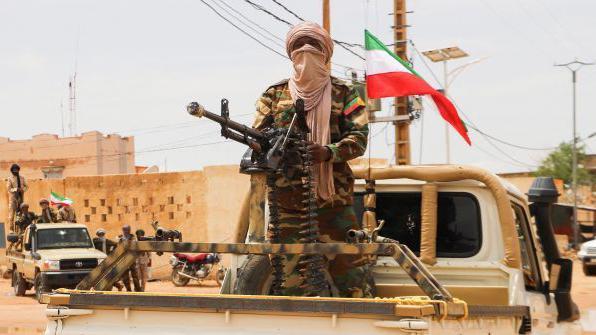The ongoing conflict in Mali has seen an escalation of tensions with accusations flying between various factions amidst a backdrop of international intrigue. Reports have surfaced claiming that Ukraine has supplied drones to Tuareg rebels fighting against the Malian military and its Russia-backed mercenaries. The allegations were notably published by the French newspaper Le Monde, which suggested that Ukraine’s involvement was providing “discreet but decisive support” to the rebels in conflict-ridden northern Mali. This development is set against Mali’s complex relationship with its former colonial power, France, which deteriorated dramatically in 2022 when the junta-led government opted to align with Russia in an effort to combat a longstanding insurgency.
The Malian government, backed by Russian mercenaries, has faced significant challenges in controlling insurgent activity, suffering heavy losses in clashes. Notably, recent reports indicated that at least 131 combatants were killed in confrontations between the Malian forces, their Russian allies, and Tuareg rebels linked to al-Qaeda. This marked a catastrophic setback for the Wagner Group, now rebranded as Corps Africa, and highlighted the vulnerabilities of the Malian military in its ongoing struggle to assert authority over its northern regions. In the wake of these losses, Malian officials, alongside leaders from neighboring Niger and Burkina Faso—both ruled by military regimes—began to accuse Ukraine of engaging in support for terrorism in the Sahel region.
Ukraine has vehemently denied these allegations, asserting that it has not supplied drones or any form of military assistance to the Tuareg rebels. The Ukrainian Foreign Ministry issued a strong rebuttal, condemning the accusations as false and characterizing them as a product of Russian propaganda. Ukrainian officials specifically targeted narratives that implied direct involvement in arming the rebel factions, emphasizing a need to cease spreading unfounded claims that could destabilize the region further. The ongoing conflict in Mali has become a point of contention not just within the nation but in its diplomatic relations as well, leading to Mali’s decision to sever ties with Ukraine in August.
Contextually, the tensions in Mali are set against a broader geopolitical landscape, where Ukraine is under severe scrutiny and isolation due to its ongoing war with Russia. Consequently, Moscow has sought to bolster its influence in Africa by establishing military and political partnerships, particularly in nations grappling with insurgent violence and instability. This shift in alliances from France to Russia by the Malian military government illustrates a strategic pivot aimed at leveraging external support to combat internal threats, although it has not yielded the desired stability thus far.
The situation on the ground in Mali is characterized by a convoluted web of alliances, loyalties, and enmities. Leaders of Tuareg rebel factions appear to have begrudgingly admitted some form of connection to Ukraine following comments made by a Ukrainian military intelligence spokesperson, who claimed that the rebels had received vital information for conducting successful military operations against Malian and Russian forces. This acknowledgment of cooperation, however, remains vague concerning the specifics of Ukraine’s involvement or the origins of any potential military support.
As Mali continues to grapple with insurgency challenges and international accusations, the broader ramifications of these events extend beyond its borders, affecting the stability and security dynamics of the entire Sahel region. The interplay of various state and non-state actors, including external powers like Ukraine and Russia, underscores the complexity of the situation, which is steeped in historical grievances and contemporary geopolitical rivalries. Amidst this turmoil, the re-engagement of international powers in Africa as both strategic partners and influencers is increasingly visible, engaging with the local power struggles and shaping the future trajectory of nations like Mali.

